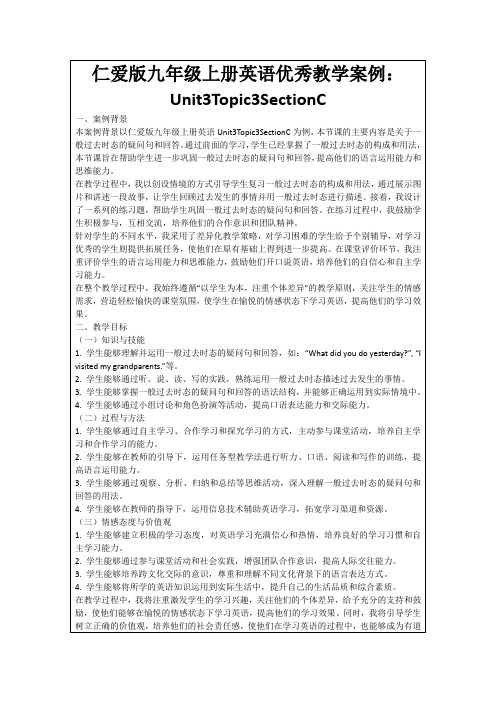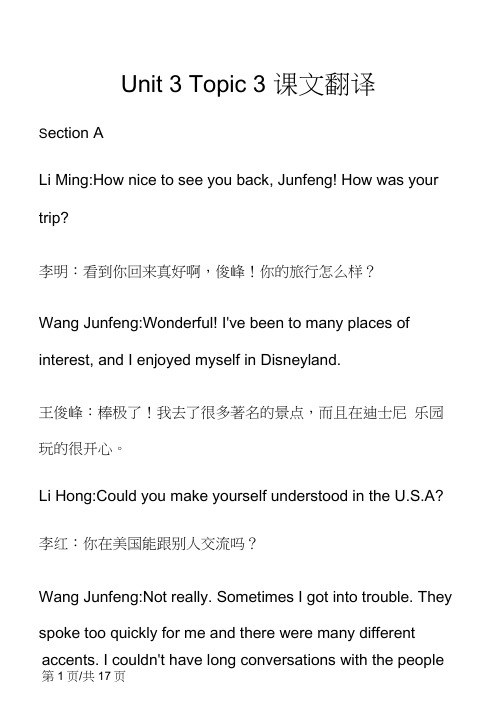仁爱版英语九年级上册中学同步练习:unit3topic3
仁爱版九年级英语上Unit3 Topic3课文重难点讲解

4. It’s an honor to talk with all of you. 意思是“与在座的各位交谈是我的荣幸。”
⑴It’s an honor to sth. 很荣幸做某事 e. g. _I_t’_s_a_n_h_o_n_o_r_t_o__b_e_in_v_i_t_ed__t_o give a speech here.
5. Our group agrees with some of Group One’s opinions. 意思是“我们组同意一组的一些观点。”
⑴agree with sb. 意为“同意某人的意见/看法” e. g. I quite agree with her on the sports.
我非常同意她在运动方面的观点。 ⑵agree to表示“同意提议、办法、计划” e. g. We hope that you will agree to this plan.
the U.S.A. 我英语很差,所以在美国我不能使自己被理 解(别人不理解我所说的 )。 类似的短语:“have +宾语+过去分词” ⑶“make +宾语+动词原形(宾语补足语)”,表示主动关系。 e. g. _I_c_a_n_’t_m__a_k_e_h_i_m__u_n_d_e_rs_t_a_n_d my words. 我无法让他领会我的话。
九年级英语课文重难点讲解 Unit3 Topic3
1. Could you make yourself understood in the USA? 意思是“_在__美__国__别__人__会__听__懂__你__的__话__吗__?_”
⑴make oneself understood意为“_使__某__人__自__己__被__理__解__” ⑵“make + 宾语+ 过去分词(宾语补足语)”,表示被动关系。 e. g. My English is so poor. I can’t make myself understood in
仁爱版九年级英语上册 Unit 3 Topic 3 重难点知识归纳总结

仁爱版九年级英语上册 Unit 3 Topic 3 重难点知识归纳总结Topic 3 Could you give us some advice on how to learn English well?【重点单词】1.accent /ˈæksent/ n. 口音,腔调2.oral /ˈɔːrəl adj. 口头的3.dare /deə(r)/ v. 敢,敢于4.sleepy /ˈsliːpi/ adj. 想睡的,困倦的,瞌睡的5.final /ˈfaɪnl/ adj. 最终的,最后的6.real /ˈriːəl/ adj. 真实的,实际存在的;真正的7.retell /ˌriːˈtel/ v. 复述,重新讲述8.indirect /ˌɪndəˈrekt/ adj. 间接的,附带的9.granddaughter /ˈɡrændɔːtə(r)/ n. (外)孙女10.pronounce /prəˈnaʊns/ v. 发音,读(音)11.dialog /'daɪəlɒɡ/ n. 对白,对话position /ˌkɒmpəˈzɪʃn/ n. 作文;作曲;构成13.copy /ˈkɒpi/ v. 抄写;复印14.notebook /ˈnəʊtbʊk/ n. 笔记本15.diary /ˈdaɪəri/ n. 记事簿;日记,日记簿16.tape /teɪp / n. 磁带,录影带17.aloud /əˈlaʊd / adv. 大声地18.object /ˈɒbdʒɪkt / n. 物品,东西;目的,目标19.textbook /ˈtekstbʊk n. 教科书,课本20.ability /əˈbɪlətɪ/ n. 能力;才能21.toothpaste /ˈtuːθpeɪst/ n.牙膏22.preview /ˈpriːvjuː / v. 预习;预告23.review /rɪˈvjuː/ v. 复习;回顾n. 复习;复查;评论24.translate /trænzˈleɪt/ v. 翻译25.discussion /dɪˈskʌʃn/ n. 讨论,谈论,商讨26.exactly /ɪg'zæk(t)lɪ/ adv. 精确地,确切地27.honor /ˈɒnə(r)/ n. 尊敬,荣幸v. 给予表扬(或者奖励、头衔、称号);尊敬,尊重28.chant /tʃɑːnt n. 重复唱的歌词;圣歌29.achieve /əˈtʃiːv/ v. 达到,获得;成功30.easily /ˈiːzəli/ adv. 容易地,轻易地31.download /daʊn'ləʊd/ v. 下载32.actually /ˈæktʃuəli/ adv. 的确,事实上33.effective /ɪˈfektɪv/ adj. 有效的,产生预期效果的34.imitate /ˈɪmɪteɪt/ v. 模仿,仿效【重点短语】1.be afraid of doing sth. 害怕做某事2.at times有时3.feel like doing sth. 想要做某事4.give up 放弃5.ask sb. for help 向某人寻求帮助6.be good at 擅长于7.in public当众8.take part in 参加9.keep a diary 写日记10.give sb. some advice on/about... 给某人一些有关……的建议11.be weak in 不擅长12.make mistakes 犯错13.stick to (doing) sth. 坚持(做)某事14.take a deep breath 深呼吸15.take notes 记笔记16.prefer doing sth. 更喜欢做某事17.agree with 同意18.advise sb. to do sth. 建议某人做某事19.as often as possible 尽可能经常地20.remember to do sth 记得去做某事21.as long as 只要22.have no chance to do sth. 没有机会做某事23.practice doing sth. 练习做某事【重点句型】1.Could you make yourself understood in the USA?在美国,你能让别人懂得你的话吗?2.I don’t know what to do.我不知道该怎么办。
仁爱版英语九年级上册Unit3 Topic3 语法知识归纳

Unit3 Topic3 语法知识归纳(一)派生词和复合词(1) 派生:就是在一些词的后面加上前缀或后缀,构成一个新词。
①表示否定的前缀。
如:un-, dis-等。
unhappy, dishonest.②表示程度或大小的前缀。
如:super-, mini-等,superman,minibus.③表示位置,时间或顺序的前缀。
如:fore-, re-等,forehead, retell.④其他前缀。
如:a-, kilo-等, alive, kilogram.⑤名词后缀。
如:-er, -ment等,teacher, agreement.⑥形容词后缀。
如:-ful, -y等,useful, dirty.⑦动词后缀。
如:-ize, -en等,modernize, widen.⑧副词后缀。
如:-ly等,happily.(2)合成:是指由两个或两个以上的独立的词合成一个新词。
合成词有的用连字符号连接,有的不同。
它又分成合成名词,合成形容词,合成代词,合成副词5种。
如:①合成名词,如:spaceship, hometown等。
②合成形容词,如:kind-hearted(好心的)good-looking (好看的)等。
③合成代词,如:somebody, anything等。
④合成动词,如:underline, overwork等。
⑤合成副词,如:sometimes, nearby等。
(二)疑问代词(副词+动词不定式)疑问代词(副词)+动词不定式的功能:动词不定式和疑问代词who, who, which不定式”结构。
它在作用上及疑问副词how, where, when连用,构成“疑问词+相当于一个wh —词引出的名词性从句,常用在某些动词(如tell, know, imagine, learn, decided, forget, remember, consider, understand等)后面作宾语,还可作主语、宾语、表语等。
仁爱版英语九年级上册Unit 3 Topic 3 Section A 配套练习

九〔上〕Unit3Topic3SectionA课时配套练习一.根底过关:(A) 根据汉语提示,完成句子。
1.I stayed up last night and I am_______(瞌睡)now。
2.How do you_____ (发音)that Word?3.The teacher asked me to read this____(对话)loudly.4.When did you begin to keep a_____(日记)?5.He _____(抄写)the numbers into his notebook..(B) 按要求变换单词:7.cover的反义词_______.8.main的副词_____ .9.snow的形容词_____ .10.healthy的反义词_____.二:单项选择〔〕1.Mr. Hu didn’t know_____do when he heard the news.A.howB.how toC.whatD.what to( )2.Joan is shy and she______speak aloud in public.A.not dareB.dare notC.not daresD. dares not( )3.Do you feel like_____to the sea with me?A.walkB.walkingC.to walkD.to walking( )4.---Have you seen_____ pandas before?--Yes.I Saw them in the zoo.They were very cute.( )5.---Mr.Wu,do you think I can study English well?---Yes, it`s_______for you to learn it well if you work hard.( )6.Peter`s Chinese was very poor when he came to China, so he couldn’t make himself._______.A. understandsB. understandingC. understandD. understood( )7.Leo was so___that he slept in sofa.A( )8.The old farmer felt like_______a big house very much.( )9 She________walk at night.How brave she i s!’t dare to( )10.I will go to my doctor for _____on healthy diet.A.an adviceB.some adviceC.any adviceD.some pieces of advice拓展训练The best way of learning a language is using it. 1 Sometimes you'll get your words mixed up and people will not understand you. 2 But if you keep your sense of humor,you can always have a good laugh at the mistakes you make. 3 It's better for people to laugh at your mistakes than to be angry with you, 4 The most important thing for learning English is: 5 .根据短文内容,从下面五个选项中选出能填入文中空缺处的最正确选项,使短文意思通顺,内容完整。
仁爱版九年级上册英语优秀教学案例:Unit3Topic3SectionC

1.教师引导学生对一般过去时态疑问句和回答的用法进行总结,帮助学生巩固所学知识。
2.教师通过归纳和总结,强调一般过去时态疑问句和回答的重要性和实用性,激发学生运用语言的欲望。
3.教师提醒学生注意一般过去时态疑问句和回答在实际交际中的运用,如:与外国朋友交流、看英文电影等。
(五)作业小结
3.图片情境:展示一系列相关的图片,让学生根据图片内容用一般过去时态进行描述,培养学生的观察能力和语言表达能力。
4.角色扮演:学生分组扮演不同角色,模拟实际场景,用一般过去时态进行对话,提高学生的口语表达能力和交际能力。
(二)问题导向
1.设计具有启发性的问题,引导学生思考和探索一般过去时态的疑问句和回答的用法,如:“How do we ask about someone's past?”, “What is the difference between 'go' and 'went'?”等。
3.教师举例说明一般过去时态疑问句和回答的用法,并通过角色扮演的方式进行演示,让学生直观地理解和学习。
(三)学生小组讨论
1.学生分组进行讨论,共同完成任务,如:编写一段对话,使用一般过去时态描述过去发生的事情。
2.学生通过观察和分析例句,归纳和总结一般过去时态疑问句和回答的语法规则。
3.学生进行小组展示,分享自己的学习成果,并互相评价和反馈,培养学生的合作意识和批判性思维能力。
2.学生进行自我评价,评估自己在学习中的表现,如:口语表达能力、听力水平、写作能力等,培养学生的自我评价和自我调整能力。
3.教师对学生的学习成果进行评价,关注学生的知识掌握和技能运用情况,如:是否能正确使用一般过去时态的疑问句和回答,是否能流利地进行口语表达等。同时,教师要注重评价学生的情感态度和价值观,如:学习积极性、团队合作精神、跨文化交际意识等。
仁爱英语九上Unit3Topic3单词、词汇重点句型、语法等复习课件

Topic 3 It’s important to learn English well
一。重点词汇
• sleepy adj.困倦的 final adj. 最后的,
• grammar n. 语法 whom pron. 谁(宾格)
• weak adj. 弱的 dare modal v.敢,敢于
idea of the article.尽量猜测生词的意思,理解文章的大意。 • 5.I dare not answer questions in class, because I’m afraid of
making mistakes.我不敢在课堂上回答问题,困为我害怕犯错误。 • 6.It’s an honor to talk with all of you. • 与在座的各位交谈是我的荣幸。 • 7.But remember to choose the ones that fit you best. • 但是记住要选择最适合你的一种。 • 8.I insist that you practice English every day. • 我坚持认为你们每天都应该练习英语。 • 9.Believing in yourself is the first step on the road to success. • 自信是通往成功的第一步。
• 17.have a conversation with/ have a talk with.. 与…谈话
• 18. be in trouble
陷入困境
• 19.the final test
ห้องสมุดไป่ตู้
期末测试
• 20.make yourself understood
仁爱英语九年级上册Unit3Topic3课文翻译

Unit 3 Topic 3 课文翻译S ection ALi Ming:How nice to see you back, Junfeng! How was your trip?李明:看到你回来真好啊,俊峰!你的旅行怎么样?Wang Junfeng:Wonderful! I've been to many places of interest, and I enjoyed myself in Disneyland.王俊峰:棒极了!我去了很多著名的景点,而且在迪士尼乐园玩的很开心。
Li Hong:Could you make yourself understood in the U.S.A? 李红:你在美国能跟别人交流吗?Wang Junfeng:Not really. Sometimes I got into trouble. They spoke too quickly for me and there were many differentthere. I think I should work harder at English.王俊峰:不太能。
有时候我会遇到麻烦。
对我而言,他们说话速度太快,而且有很多种不同的口音。
我无法跟他们进行长对话。
我觉得我应该更加努力地学英语。
Li Ming:Yes, I agree. I know oral English is very important, but I dare not speak English in public. And I always feel sleepy in English classes. I'm really afraid of the final exam. 李明:嗯,我赞成。
我知道口语特别重要,可是我不敢在别人面前说英语。
而且我在英语课上老是犯困。
我真的很担心期末考试。
Li Hong:I'm afraid, too. And it's very difficult for me to remember new words.李红:我也很担心。
仁爱版九年级上册英语优秀教学案例:Unit3Topic3SectionD

在课堂教学的最后环节,我组织学生进行反思与评价。首先,让学生回顾本节课所学的主要内容,总结自己的学习收获。然后,让学生对自己的学习过程进行评价,找出自己在学习中的优点和不足,为今后的学习提供参考。
此外,我还设计了一份课堂评价表,让学生对其他同学的表现进行评价。通过这种评价方式,学生能够更好地了解自己的学习情况,发现他人的优点,促进课堂学习的良性互动。在评价过程中,我注重鼓励学生,激发他们的自信心,让他们在评价中感受到进步和成长。
仁爱版九年级上册英语优秀教学案例:Unit3Topic3SectionD
一、案例背景
本案例背景以仁爱版九年级上册英语Unit3Topic3SectionD为例,本节课的主题是关于环境保护,通过讨论如何保护我们的家园,来提高学生的环保意识。本节课的主要内容是让学生掌握一些关于环境保护的词汇和表达方式,并能够运用这些词汇和表达方式进行简单的对话。在教学过程中,我以学生为主体,注重培养学生的语言表达能力和思维能力,通过多种教学活动,激发学生的学习兴趣,提高学生的学习积极性。
在讲解环保知识时,我提出了许多问题,如“为什么我们要保护环境?”“如何评价一个人的环保行为?”等,让学生进行思考和讨论。通过这些问题,学生能够更深入地理解环保的重要性,提高他们的思维能力。此外,我还设计了一些具有挑战性的练习题,让学生在解决问题的过程中,运用所学知识,进一步提高他们的解决问题的能力。
四、教学内过一个简单的环保知识小测试,激发学生的兴趣。然后,我向学生展示了一些环保问题的图片和视频资料,让学生直观地感受到环境问题的严重性。接着,我让学生自由发言,谈谈他们对环保的看法和做法。通过这种导入方式,学生能够更好地进入学习状态,为新课的学习做好铺垫。
(三)学生小组讨论
- 1、下载文档前请自行甄别文档内容的完整性,平台不提供额外的编辑、内容补充、找答案等附加服务。
- 2、"仅部分预览"的文档,不可在线预览部分如存在完整性等问题,可反馈申请退款(可完整预览的文档不适用该条件!)。
- 3、如文档侵犯您的权益,请联系客服反馈,我们会尽快为您处理(人工客服工作时间:9:00-18:30)。
Unit 3 Topic 3
(满分100分,时间90分钟) 题号
第一部分 第二部分 第三部分 总分 Ⅰ
Ⅱ Ⅲ Ⅳ Ⅰ Ⅱ Ⅲ Ⅳ Ⅰ Ⅱ Ⅲ 得分
第一部分 听力 (20分)
Ⅰ.听句子,选择正确图片。
每个句子读一遍。
(5分)
1._____
2._____
3._____
4._____
5._____
Ⅱ.听对话,选择正确答案。
每段对话读两遍。
(5分)
( )6.What’s Kitty’s problem in English?
A.She can’t understand certain grammars.
B.Her pronunciation is not quite right.
C.She can’t translate every word.
( )7.What’s the old man?
A.A worker.
B.A learned and kind teacher.
C.A doctor.
( )8.What is wrong with Lucy?
A.She is worried about her spoken English.
B.She is worried about her written English.
C.She is worried about going to the English Corner.
( )9.Who are the two speakers?
A.Neighbors.
B.Old classmates.
C.Teacher and student.
( )10.How many good methods are there for learning English?
A.Quite a lot.
B.One.
C.Some. Ⅲ.听短文,完成下面表格。
短文读两遍。
(5分)
An English Speech
Purpose
to help students learn more about 11. Contents(内容)
the differences between Chinese customs and12. Speaker
Mr. Brown from 13. Time
at 14. on October 21 Place in 15. of the Library Building Ⅳ.听短文,选择正确答案。
短文读两遍。
(5分)
( )16.What did Tom ask John to do one evening?
A.To look after his father.
B.To help him with his English.
C.To go to the park. F。
